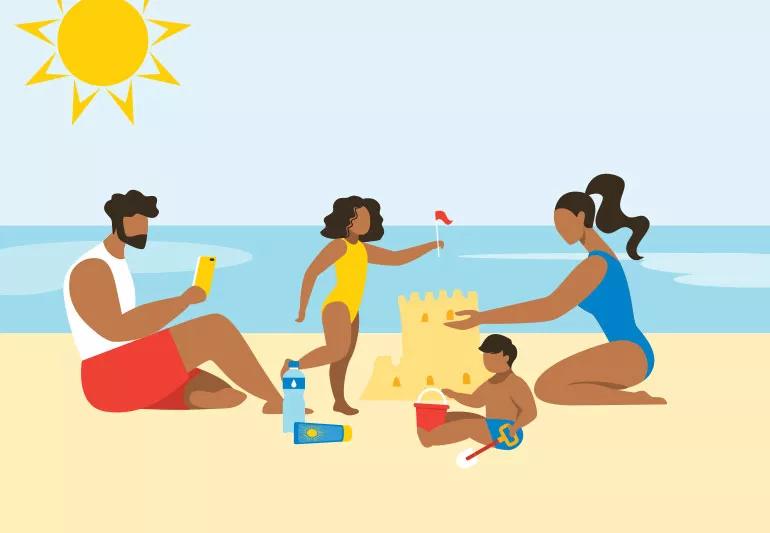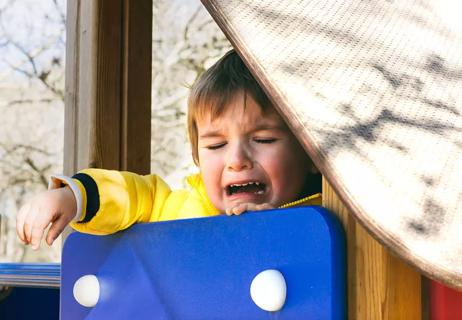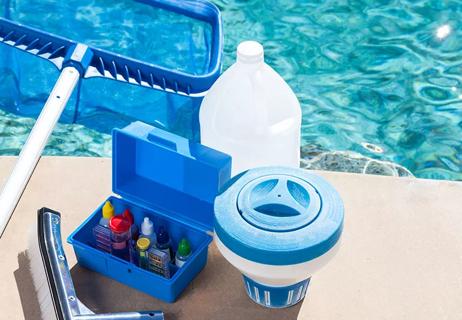As temperatures increase, so does the need for safety precautions

Summer is a great time for kids to get outside and enjoy the weather — but it’s important for parents and guardians to remember safety tips throughout the season.
Advertisement
Cleveland Clinic is a non-profit academic medical center. Advertising on our site helps support our mission. We do not endorse non-Cleveland Clinic products or services. Policy
“We want children to run, play and enjoy themselves, but we also have to be mindful that certain environmental elements may be potentially dangerous to them,” says pediatrician Paula Sabella, MD.
Dr. Sabella shares 10 ways to keep your kids safe this summer, including how to avoid dehydration, tips to protect skin from the sun, and care for bites and bruises.
Sunburn is the scourge of summer, and kids are especially susceptible. It’s important that you lather your child with sunscreen any time they’re headed outdoors. The American Academy of Pediatrics recommends that children wear sunscreen with at least 15 to 50 SPF.
Remember to reapply sunscreen every two hours or after swimming, sweating or toweling off, and consider wearing sun protection clothing for an added barrier.
Sunscreen isn’t recommended for babies under six months, who should always be kept out of direct sunlight. Keep your littlest ones protected from the sun by dressing them in lightweight clothing and sun hats, and using umbrellas for shade.
“Harmful ultraviolet rays are at their strongest from between 10 a.m. to 4 p.m. Minimizing outdoor play during these hours also minimizes the risk of sunburn to children,” Dr. Sabella explains, “but even when they’re in the shade, continue to use sunscreen!”
Advertisement
When it comes to warm weather, hydration is key — and not just when kids are playing sports or sitting in the sun. “Keep kids hydrated at all times, especially the day before a big activity or even the day before a play date,” Dr. Sabella advises.
Steer clear of soda, energy drinks and fruit juices, which may worsen dehydration. Water is the best source of hydration for kids who are over 1 year old, while breast milk and formula are the preferred fluids to hydrate kids under a year. To gauge whether your child is hydrated enough, take a peek at the color of their urine. It should be a light yellow color, not golden or dark.
Sodas and ice cream trucks and cookouts, oh, my! Opportunities for junk food abound during the summer, but abiding by healthy eating habits for kids while they’re out of school will ensure that your little ones learn healthy, consistent habits and get the vitamins and nutrients they need to fuel their summer fun.
You probably think you could never, ever forget your child in the car on a hot day — but researchers estimate that half of all hot-car deaths involve a loving caregiver who forgets a sleeping child in the backseat of their car.
“We’re all human,” Dr. Sabella says, “and there are some things caregivers can do to help ensure that they don’t forget their child in the car.”
She recommends developing daily habits that can prevent hot-car deaths
There’s no safe situation, temperature or length of time for a child to be left alone in a car.
As kids head outdoors to play with friends and ride bicycles around the neighborhood, make sure they’re practicing bike safety, including riding a properly fitted bike and wearing a properly fitted bike helmet.
“Adults can be good role models for children by always wearing their own bike helmets and abiding by the same bike safety rules we’re asking kids to follow,” Dr. Sabella notes.
The American Academy of Pediatrics reports that drowning is the leading cause of injury-related death in U.S. children ages 1 to 4 — so take to heart pool safety tips for families, from drain covers and fenced enclosures to life vests, swimming lessons and CPR classes.
Advertisement
Toddlers should be no further than an arm’s length away from their guardian when they’re around a pool or any other body of water. Empty buckets, bathtubs, coolers and wading pools immediately after use.
“I also recommend that nonswimming children always wear life vests when in water,” Dr. Sabella says. “And any time you’re on a boat or watercraft, everybody should be wearing life vests — adults and kids alike, both swimmers and nonswimmers.”
Your kids aren’t the only ones playing outside! When the weather warms up, the creepy-crawlies come out en masse, and little ones are liable to fall victim to bites and bumps.
Advertisement
Children under 15 years old account for about a third of fireworks-related emergency department visits — most of which involve burn injuries to fingers, hands and eyes.
“Taking safety precautions will allow your family to enjoy summer fireworks worry-free,” Dr. Sabella says.
Don’t give sparklers or bottle rockets to children, and practice other fireworks safety recommendations for both children and adults.
As they spend more time outdoors during the summer, kids may be more prone than ever to scrapes and bruises. Practice safe playground habits to prevent injuries.
Advertisement
To be on the safe side, keep a first aid kit handy and brush up on how to treat common playground injuries, from splinters and friction burns to bumps and bruises.
Kids of all ages should take breaks from playing outside by retreating into the shade — or, even better, into air-conditioning — every 20 minutes to 30 minutes.
“Kids need time to relax, cool off and hydrate before they return to play,” Dr. Sabella says. “And once they’re done playing for the day, continue to keep up that hydration.”
Hot, humid weather also puts active kids at a higher risk for developing heat rash, so take precautions to avoid it and make sure you know how to treat it in case it happens.
By following common-sense safety precautions, you can set your child up for a safe and enjoyable summer — without necessarily hovering over their shoulder all season long.
“Be mindful of the sun, keep an eye on hydration, and keep pool safety and water safety in mind,” Dr. Sabella encourages. “And most of all, have fun, love your children and enjoy the summer safely with your children.”
To hear more from Dr. Sabella on this topic, listen to the Health Essentials Podcast episode, “Tips To Keep Your Kids Safe This Summer.” New episodes of the Health Essentials Podcast publish every Wednesday.
Learn more about our editorial process.
Advertisement

Breathing in toxic smoke can lead to serious health problems

Watch the weather, keep lines of communication open and make sure everyone on board has access to a personal lifejacket or flotation device

From bug bites and blisters to sunstroke and swimming safety, here’s how to stay well this season

From split lips to splinters, a little first aid can get your kiddo back on the swing set in no time

Breathing in unhealthy air can harm your lungs, heart and more

Establish rules and have a safety plan in place

Prevent irritation, illness and more by using pool chemicals the right way

Make sure your wood has been split and stored for at least 6 months

The tropical fruit is a good source of antioxidants and vitamin C

Most people fall asleep within 10 to 20 minutes, but if your experience is different, adjusting your sleep schedule may help

Exploring your hidden side can lead to better understanding of what makes you tick